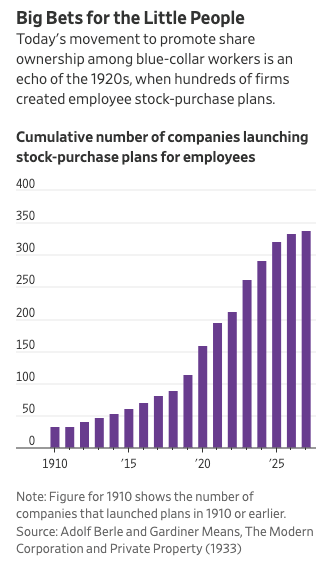The private-equity industry has created an initiative called Ownership Works, that offers a chance for workers to cash in on the wealth that the industry has created and until recently has only been enjoyed by those that run and invest in it, writes Jason Zweig in a piece for The Wall Street Journal. Ownership Works is backed by 19 private-equity firms, with a goal to distribute at least $20 billion over the next 10 years to lower-income workers and make them stockholders.
There have been many attempts at “sharing the wealth” in U.S. history, though not all of them have been successful. In the 1920s, there was a movement that called for U.S. businesses to allow profit-sharing and other ownership incentives to their employees, which also not-so-surreptitiously discouraged unionization or higher wage demands. But when the Crash of 1929 happened, employees that had bought shares were left empty-handed.
Then in 1974, profitable tax benefits became available to employers who created Employee Stock Ownership Plans (ESOPs), thanks to federal pension laws. Over 6200 American companies offer ESOPs, with 10.2 million active employee participants holding $301 billion in company stock. And research shows that companies who offer ESOPs generally grow faster and are more profitable, with happier—and wealthier—employees, the article posits.
There’s a dark side to ESOPs, however; some companies have used them to bail themselves out of bankruptcy, hoping for big stock gains that didn’t always pan out, and of course Enron is synonymous with the devastation they wreaked on their employees’ ESOPs. So while ESOPs can motivate workers by turning them into owners, they may also force workers to take risks that they can’t afford. Many workers will be invested in the stock market only through the stock they own in their ESOP, so if they lose their job they’re out of work and their stock holding all at once.
But Ownership Works won’t allow its companies to use stock grants in place of wage increases or better benefits, Zweig writes. And, shares are a free benefit instead of a mandatory purchase in the program. Eight companies that have share programs for their employees were sampled and found to have wage increases ranging from 3% to 13%, on par with the nationwide rate of 4% to 5%.“We’re making sure that lower-wage colleagues aren’t being asked to invest out of pocket,” says Pete Stavros, the founder of Ownership Works. “We don’t want workers putting their own capital at risk.”
Of course, if there’s a stock market crash or a lengthy bear market, employees might turn on their ESOPs. But for as long as the market keeps rising, workers that become owners could see a lucrative return for years to come.



